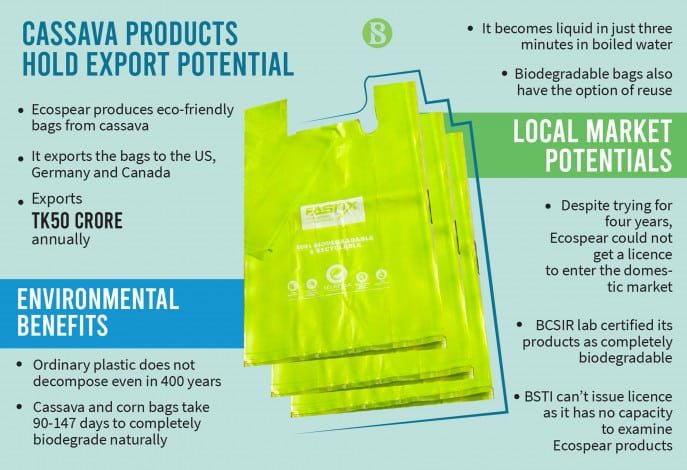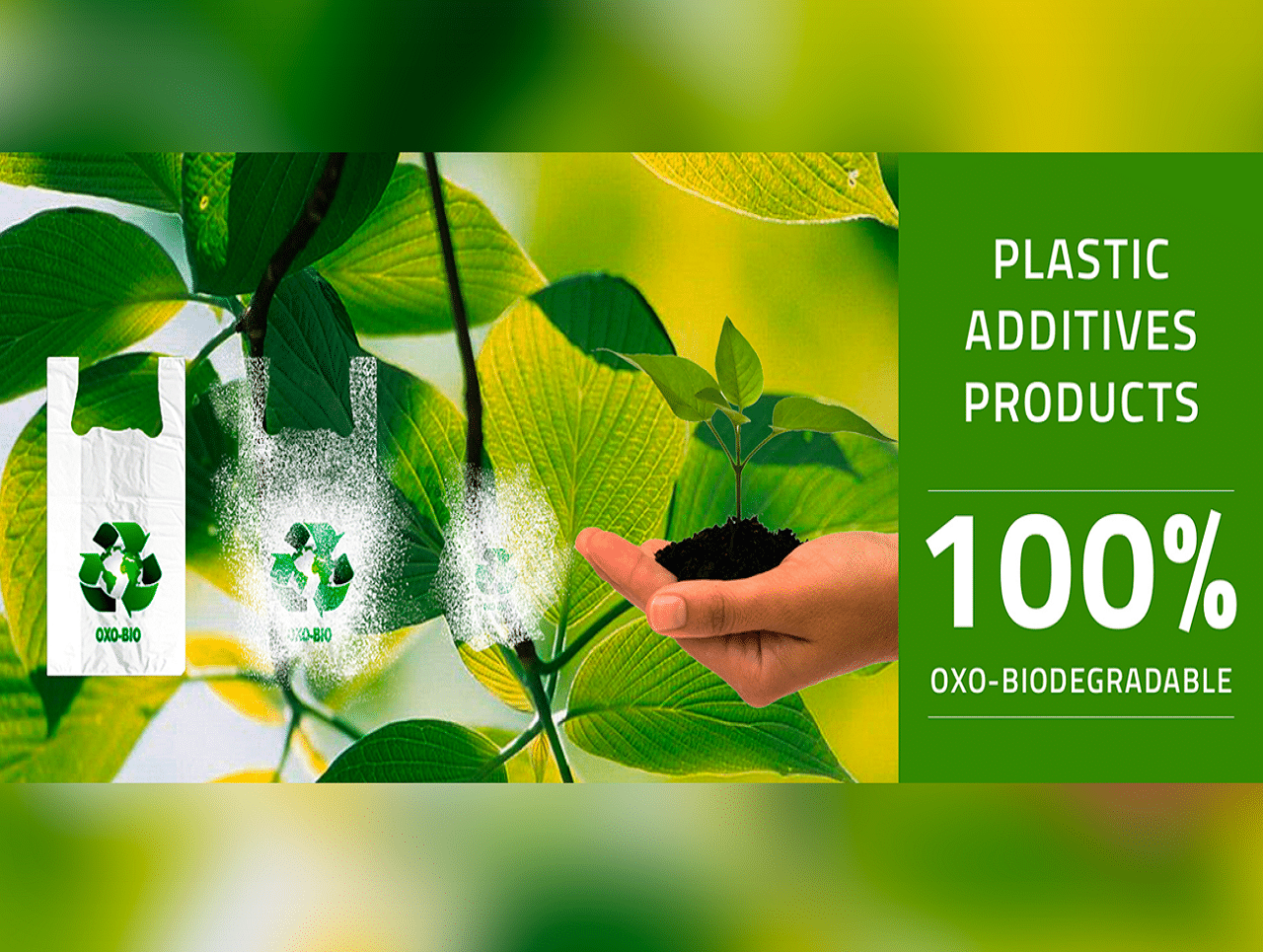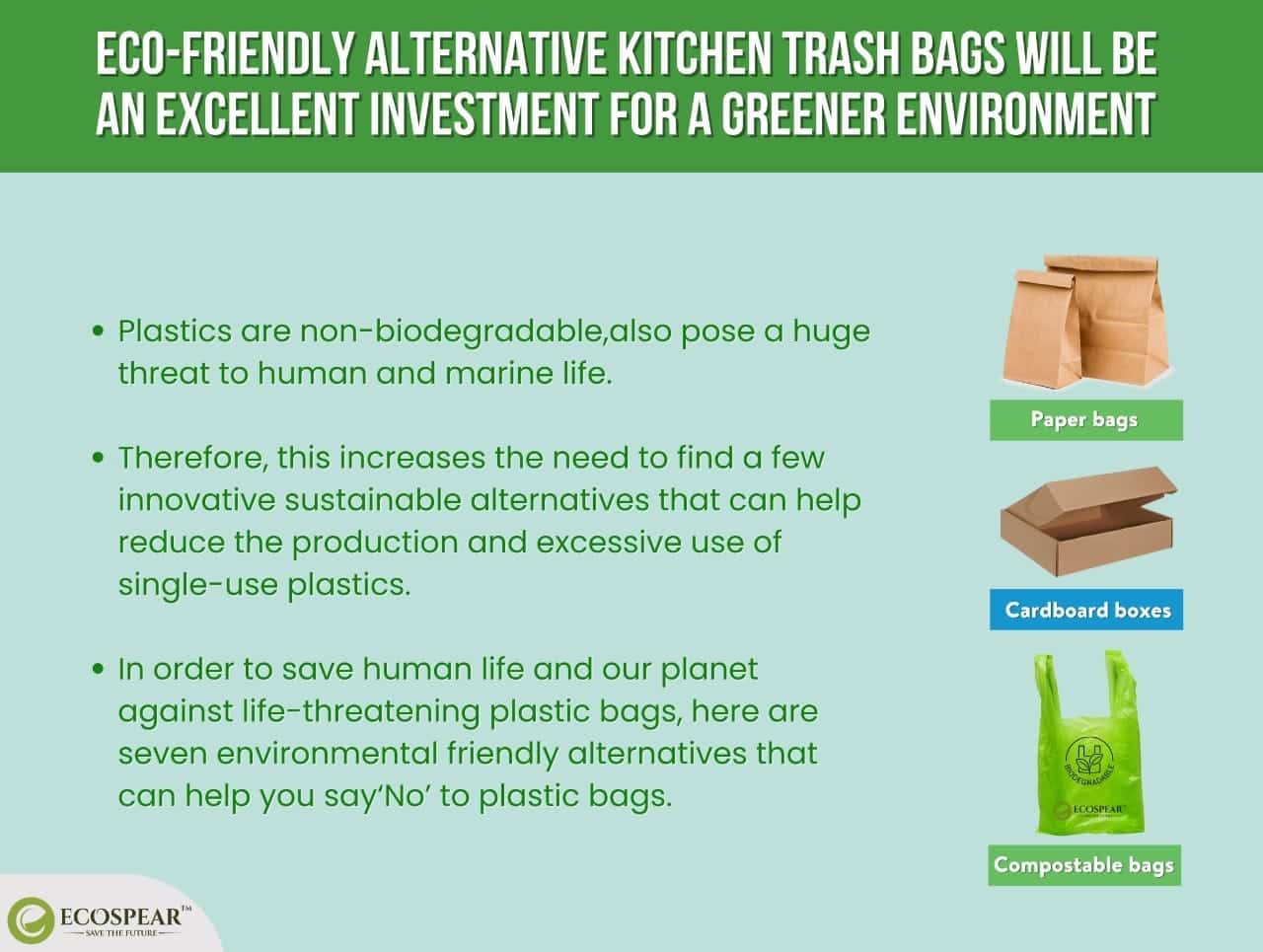Ecospear, which came into being from the immediate necessity to mitigate the environmental crisis in Bangladesh, manufactures eco-friendly bags with cassava – a root crop known as “Shimul Alu” – and earns around Tk50 crore annually from its exports.
Currently, it is exporting products to different countries around the world, such as the United States, Germany and Canada, Mohammad Raihan, founder and chief executive of the Chattogram-based company, told The Business Standard.
The company faces a drawback too. Despite great demand, Ecospear cannot make an entry into the domestic market in the absence of a licence from the agency concerned, which is not equipped enough to examine the products.
Raihan said that when ordinary plastic does not decompose even in 400 years, the bags made from cassava and corn take 90-147 days to completely biodegrade naturally once discarded.
“And in boiled water, it becomes liquid in just three minutes. These biodegradable bags also have the option of reuse. No plastic material was found in Ecospear’s products after testing at the Bangladesh Council of Scientific and Industrial Research (BCSIR) lab,” he added.
Apart from producing bags with cassava, Ecospear has been using the latest technology of Polymateria Ltd, which has been providing a tailored biodegradable solution for conventional plastic packaging since 2021 to make eco-friendly plastics. The company has named the eco-friendly plastic FASTIX. It takes only 18 months to assimilate into the soil. The company manufactures cups, bottles, straws, laundry bags, juice caps, packaging bags, white poly, garment polybags and food containers with FASTIX. Ecospear is producing two tonnes of such FASTIX products every month. The list of buyers of these products includes world-famous children’s toy manufacturers such as America’s Pebble Child.
“But since there is no machinery for processing these potato peels in the country, we import the processed peel (resin) from Indonesia and Malaysia to produce the product. But we are gradually focusing on making FASTIX. As it will save import cost, this FASTIX can be made by using any machine used in the country,” he added.
In 2002, Bangladesh became the first country in the world to ban plastic bags. The unprecedented move was widely appreciated. However, 20 years later, the country has not changed a bit. It is an everyday phenomenon that people carry things home in plastic bags throughout the day and dispose of them here, there and everywhere.
When everyone accepted this environmentally destructive phenomenon as normal, a young man from the port city started looking for an alternative to conventional plastic bags.
In 2018, Raihan began producing eco-friendly bags in the country from cassava with technical assistance from Indonesia.
“It was in May 2016. We were living in Halishahar, Chattogram. The entire coastal area of the city got submerged under the influence of cyclone Roanu. In the midst of this calamity, I discovered another great catastrophe. As the water receded, I found all the streets and canals of the city were flooded with plastic. That’s when I started looking for alternatives to plastic,” he said, narrating his experience of entering into the venture.
In 2017, in Southeast Asian countries, including Indonesia, the production of environmentally friendly (biodegradable) bags started by using the peels of potatoes called cassava.
In 2018, Raihan imported a machine from Indonesia and set up a factory in Halishahar in the port city. At present, the company has a factory in Tejgaon in the capital, where cassava, corn, and PBAT (a kind of futuristic biomaterial) are used to produce more than 15 tonnes of eco-friendly plastic bags every month.
What is FASTIX?
Polymateria Limited is a British-advanced technology development company to deal with plastic pollution. It has a lab on the campus of Imperial College, London. Bio-transformation technology invented by the company can make all types of plastics completely biodegradable in the natural environment. Comparing the ongoing plastic pollution in the world with an epidemic, the method to prevent it is called the “Vaccine for plastic”. Ecospear is working with Polymateria and the plastic produced through bio-transformation technology has been locally named as FASTIX.
Regarding the technology, Niall Dunne, chief executive officer of Polymateria, said in an interview with Bloomberg, “We’re targeting the type of plastic that’s most likely to wind up in nature with a solution that doesn’t need any composting technologies to biodegrade or capital expenditure.”
Ecospear’s Chief Executive Raihan said, “Polymateria is a chemical used in the manufacture of plastic bags, cups or bottles. As a result, it helps in the self-degradation of plastic over a period of time. It breaks down plastic polymers into the wax. The best thing is that in this process, plastic does not remain in the environment in micro or nano form. Instead, it becomes a completely natural food for bacteria and fungi.”
Ecospear will soon produce biodegradable raincoats, aprons, and sanitation covers added the young entrepreneur.

Despite its potential, it can’t enter the local market
Ecospear has been exporting eco-friendly bags abroad since 2018. Even Polymateria has recently observed the Bangladesh market and reported its great potential.
Richard Horne, the chief commercial officer of Polymateria, told TBS that the technology is already being used in Taiwan, Indonesia, Malaysia, and India. Recently, Taiwan’s Formosa Plastics Corporation signed a $100 million contract with the British company.
He said there is a great opportunity to manufacture and market biodegradable plastic products in Bangladesh. But for this, the country’s industrial approval agencies should be prepared.
Richard Horne said global food production companies, the pharmaceutical industry, and packaging companies are interested in using this type of plastic. The Mumbai-based brand Godrej is one of them.
But despite trying for four years, the Bangladeshi company Ecospear could not get a license to enter the domestic market.
Monotosh Kumar Dash, an assistant director of the Bangladesh Standards and Testing Institution (BSTI), told TBS that a license is required to bring any product to the country’s market.
“Currently, we have 229 product testing labs. But we don’t have a lab to test the standard products that Ecospear wants to bring to the market. So we don’t have the scope to issue a license right now. However, there is verbal approval for the marketing of the products.
In his turn, Raihan said, “It is not possible to do business in the country only with verbal permission as it requires managing many agencies.”
He said the BCSIR lab certified the company’s products as completely biodegradable within 147 days.
Besides, in 2021, the US-based independent plastic specialists’ organization Impact Solutions and Netherlands-based Well Research certified Ecospear’s products as “compostable” and “biodegradable” in their reports, he added.
Md Ziaul Haque, director (Dhaka Region) of the Department of Environment, said, “The bag made by Ecospear has been tested in the BCSIR lab and has proved to be biodegradable and compostable.”
“But even though we wrote a letter recommending that the institution grant a license, the BSTI recently returned the application stating that it does not have the capacity to conduct this test,” he added.

Debate over biodegradable plastics
Scientists around the world have not been able to agree on the use of biodegradable plastic as an alternative to ordinary plastic.
Mariel Vilella, director of the Global Climate Program at GAIA (Global Alliance for Incinerator Alternatives), told TBS that biodegradable plastics are not a solution to waste management. This has not yet been scientifically proven.
Biodegradable and compostable plastics will encourage people to create more plastic waste, he worries.
But Richard Horne of Polymateria UK said about 330 million tonnes of plastic enter the environment each year, of which 40% goes to landfills, 14% is recycled, and 14% is converted from waste to energy.
The remaining 32% remains as waste in the natural environment for at least 400 to 1,000 years. In this situation, Polymateria wants to at least have these products decompose in nature.






